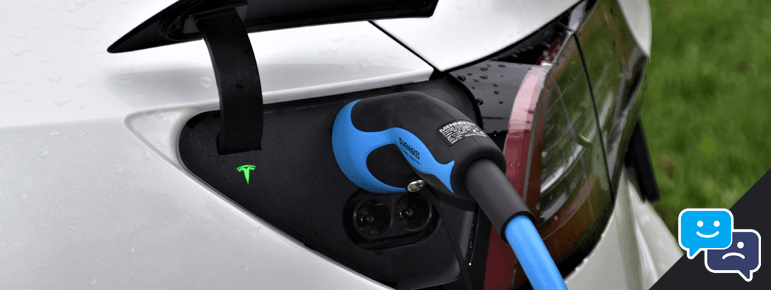Are you considering buying an electric car? If so, make sure to think about the home charging experience before committing.
Recent reports from J.D. Power suggest that EV owners may not be entirely satisfied with their current home charging situations. The study found that customer satisfaction in the segment has declined for the first time since 2017.
From long charge times and limited access points to inadequate power outputs, this post will explain why many EVs are falling short when it comes to effective recharging at home.
Let’s dive into J.D. Power findings and what improvements need to be made for mass EV adoption.
Home Charging Experience Satisfaction Declines, Study Finds.
J.D. Power has released its third annual Electric Vehicle Experience Home Charging Study, and the results are concerning for the EV industry.
The study revealed that electric vehicle (EV) owners’ satisfaction with the home charging experience declined last year due to the high costs of charging, slow charging speed, and limited charging education.
Additionally, the study found that more than two-thirds of EV owners use a mounted Level 2 home charger, and their satisfaction with charging declined 12 points last year to 740 on a 1,000-point scale.
EV owners who use a Level 1 or portable Level 2 charger also reported a decline in satisfaction.
Fact is, a positive home charging experience is critical to EV adoption. Because as much as 85% of regular EV charging is done at home.
According to Brent Gruber, executive director of the EV practice at J.D. Power, “Whether you’re an automaker, dealer or utility company participating in the EV ecosystem, improving the EV owner experience with respect to home charging should be a common goal shared by all.”
Simple truth is, this is vital for electric car adoption.
Measuring Home Charging Satisfaction
J.D. Power measured home charging satisfaction with Level 1, portable Level 2, and mounted Level 2 chargers across eight factors: cost of charging, charging speed, fairness of retail price, cord length, size of charger, ease of winding/storing cable, ease of use, and reliability.
The study, conducted in collaboration with PlugShare, measures satisfaction with the home charging experience for battery-electric and plug-in hybrid vehicles.
Nearly 14,000 owners of 2017-23 model year EVs and plug-in hybrids participated in the study, fielded from December 2022 to February 2023.
One notable finding of the study is that charger brand Tesla ranks highest in customer satisfaction. Meanwhile, legacy auto brands like Ford and Chevrolet have some of the lowest satisfaction scores.
One interesting finding – customers with newer model year EVs(2022 and 2023) are less satisfied with home charging speed than owners of older 2020 and 2021 models.
Study Finds Lack of Awareness Regarding Charger Discounts
Another concerning finding is that there is little awareness among EV owners about charger discounts, charger upgrades, and managed charging.
However, electric companies employed several promotions to encourage customers to adopt electric vehicles and take advantage of EV charger discounts.
One common tactic that has been used is to offer rebates and incentives to those who purchase or lease an EV or install a charging station. These incentives can range from a few hundred dollars to several thousand dollars, depending on the program.
Some electric companies also offered free or discounted charging to EV owners as part of their promotional efforts.
Additionally, educational campaigns had been launched to raise awareness about the benefits of EVs and charging infrastructure. Electric companies also partnered with automakers, dealerships, and other businesses to offer discounts on EVs and charging infrastructure.
Finally, some electric companies offer time-of-use pricing plans that incentivize customers to charge their EVs during off-peak hours when electricity is cheaper.
Overall, while these efforts aimed to help educate consumers about the benefits of owning an electric car, it seems the marketing efforts had limited reach.
Customer Satisfaction for EV Charging Falls
Satisfaction with charging cost fell more than 30 points from last year’s study for EV owners with portable Level 2 and mounted Level 2 chargers.
In fact, only half of owners said they were knowledgeable about utility company programs for charging at home.
And half of those with home chargers did not schedule charging times to manage costs. Those who did schedule times were more satisfied with the overall home charging experience.
Final Thoughts
As the EV marketplace continues to grow, brands that help owners take advantage of these offerings will be in a much better position down the road.
It is crucial for automakers, dealers, and utility companies to work together to improve the home charging experience for EV owners. Otherwise, declining satisfaction could hinder widespread EV adoption and growth.

Finder and reporter of automotive news & recalls. Emily is a professional writer who has covered various industries such as law, automotive, and mobility. She enjoys spending time with her family and improving her photography skills. While she loves writing, Emily’s true passion lies in helping others.

